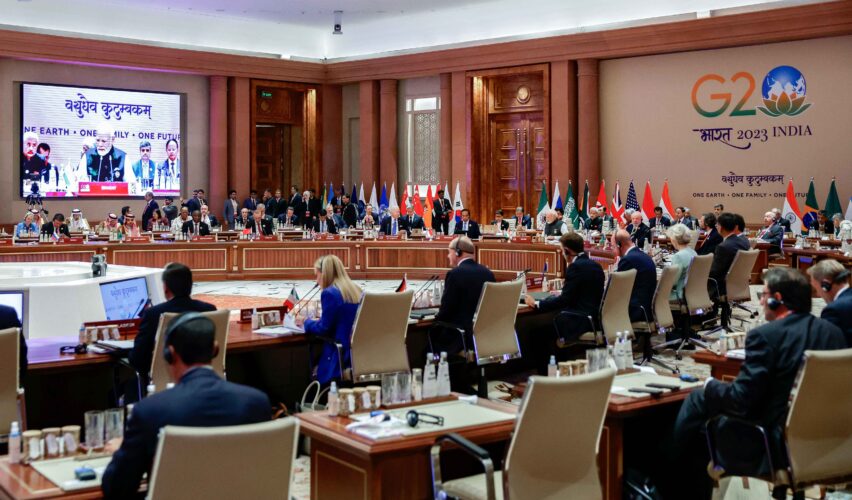The Group of Twenty (G20) proposed a global digital currency and ID system at the 2023 Summit held in New Delhi, India from Sep. 9 to 10. Under the theme of “One Earth, One Family, One Future,” world leaders from the most powerful countries in the world met to discuss climate change, healthcare, food security, and digitalization, which caught headlines among skeptics.
Following the Summit, the intergovernmental forum published a 78-page document entitled “G20 Policy Recommendations For Advancing Financial Inclusion and Productivity Gains Through Digital Public Infrastructure.” The report was written by the Global Partnership for Financial Inclusion (GPFI) under the guidance of the 2023 G20 India Presidency.
The paper discussed Digital Public Infrastructure (DPI), which it defines as “interoperable, open, and inclusive systems supported by technology to provide essential, society-wide, public and private services” that can be understood as “a core set of foundational systems that enable intensive use and provision of digital services across a range of economic and social interactions and actors.”
Examples of DPIs listed include digital ID systems, digital payment systems, and data-exchange platforms, and the paper cites systems in these categories that already exist in India, Singapore, the Philippines, the United Arab Emirates, Brazil, Turkey, and Thailand.
The paper makes a series of policy “recommendations” on DPIs. It promotes enabling and fostering DPIs to accelerate financial inclusion, establishing a set of DPI good practices including regulations and oversight standards, and ensure equity in access to DPIs so “no one is left behind.”
Learn the benefits of becoming a Valuetainment Member and subscribe today!
The 2023 members of the G20 conference included Argentina, Australia, Brazil, Canada, China, France, Germany, India, Indonesia, Italy, Japan, Mexico, Russia, Saudi Arabia, South Korea, South Africa, Turkey, United Kingdom, the United States, and the European Union’s Council and Commission. While this is the first time a digital ID system has been announced by an international cohort of this size, it is not the first time such a thing has been suggested by world leaders.
European Commission president Ursula von der Leyen called for the introduction of digital IDs modeled after the EU’s COVID-19 vaccination passports in a speech she delivered at the Summit.
“Many of you are familiar with the COVID-19 digital certificate. The EU developed it for itself. The model was so functional and so trusted that 51 countries on four continents adopted it for free,” von der Leyen boasted. “On Digital Public Infrastructures. They can be a real booster to emerging economies. […] The trick is to build public digital infrastructure, that is interoperable, open to all and trusted.”
Von der Leyen also called for an international regulatory body for artificial intelligence (AI), involving the United Nations (UN).
As it has been described, AI has risks but also offers tremendous opportunities. The crucial question is how to harness a rapidly changing technology. It is telling that even the makers and inventors of AI are calling on political leaders to regulate. In the EU, in 2020, we presented the first ever law on Artificial Intelligence. We want to facilitate innovation while building trust.
She continued:
But we need more. What the world does now will shape our future. I believe that Europe—and its partners—should develop a new global framework for AI risks. […] At global level we eventually need to reach the broader community of the United Nations. We would need a similar body to the IPCC for climate, and here we need additional outreach to the scientists entrepreneurs and innovators.
She later summarized her points on X:
The future is digital. I passed two messages to the G20: We should establish a framework for safe, responsible AI, with a similar body as the IPCC [Intergovernmental Panel on Climate Change] for climate. Digital public infrastructures are an accelerator of growth. They must be trusted, interoperable & open to all.
The future is digital. I passed two messages to the G20:
→ We should establish a framework for safe, responsible AI, with a similar body as the IPCC for climate
→ Digital public infrastructures are an accelerator of growth. They must be trusted, interoperable & open to all
Nigel Farage, former leader of UKIP and the Brexit movement, criticized von der Leyen and her comments at the G20 Summit.
She wants this to be introduced by the early 2030s and, may I add, backed up by a central bank digital currency, living in a cashless society, and now she wants the whole thing to go global. Can you image, on this ID card will be not just your date of birth, your gender, your eye color, your height, your approximate weight, there will be your vaccine status, your financial status, and goodness knows what else […] Can you imagine this data falling into the hands of bad actors?” he said. “I spoke to someone who has recently been de-banked as a result of his political opinions, and this is happening in America too as you well know. If we’re not careful, we will head toward a Chinese-style social credit system where unless you go along with the views of the day you become a non-person. I cannot think of a more dangerous initiative than this.
The U.S. dollar is currently dominant in the world, as it is used in half of all global trade and about 60% of global foreign exchange reserves, although its popularity is declining.
The dollar is being challenged by a multitude of adversaries, including Russia, China, and many other smaller countries outside of the developed world that have launched Central Bank Digital Currencies (CBDC) to get off the dollar and track purchases among its citizens.
European Union Commission president Von der Leyen also proposed a similar “e-identity” to the EU parliament in June 2021. The smartphone-accessed ID, which she termed a “European Digital Identity wallet,” would work as a proof of identity and allow users to do anything “from paying your taxes to renting a bicycle.”
Today we propose to offer Europeans a new digital identity.
One that ensures trust and protects users online.
With it, you will be able to prove your identity and share electronic documents from your European Digital Identity wallet with the click of a button on your phone. pic.twitter.com/an5FJ6eN5C
Von der Leyen also proposed a digital vaccination passport in March 2021. This was eventually passed in July 2021 as a voluntary program by the European Commission for travel between core European countries. An update in June 2022 announced the certificate would be extended until June 2023.
Then, the World Health Organization (WHO) announced it was working in partnership with the European Commission in June 2023 to create a global digital vaccination passport, justifying it as an initiative that will “strengthen global health security.” Modeling it off the European Union’s digital vaccination certificate, the WHO intends to grant all its “Member States” access to an open-source digital tool to monitor health activity and receive health services “quickly and more effectively.” The EU explicitly says the initiative intends to “establish a global system” that will protect people from not only current health threats but “future” ones as well, claiming that it helps the economy.
Under the newly announced WHO Global Digital Health Certification Network (GDHCN), the WHO explained it will develop not only this global certificate but “a wide range of digital products to deliver better health for all.” It said it would be working with the European Commission to “encourage maximum global uptake and participation,” with particular focus on “low and middle-income countries.”


















Add comment